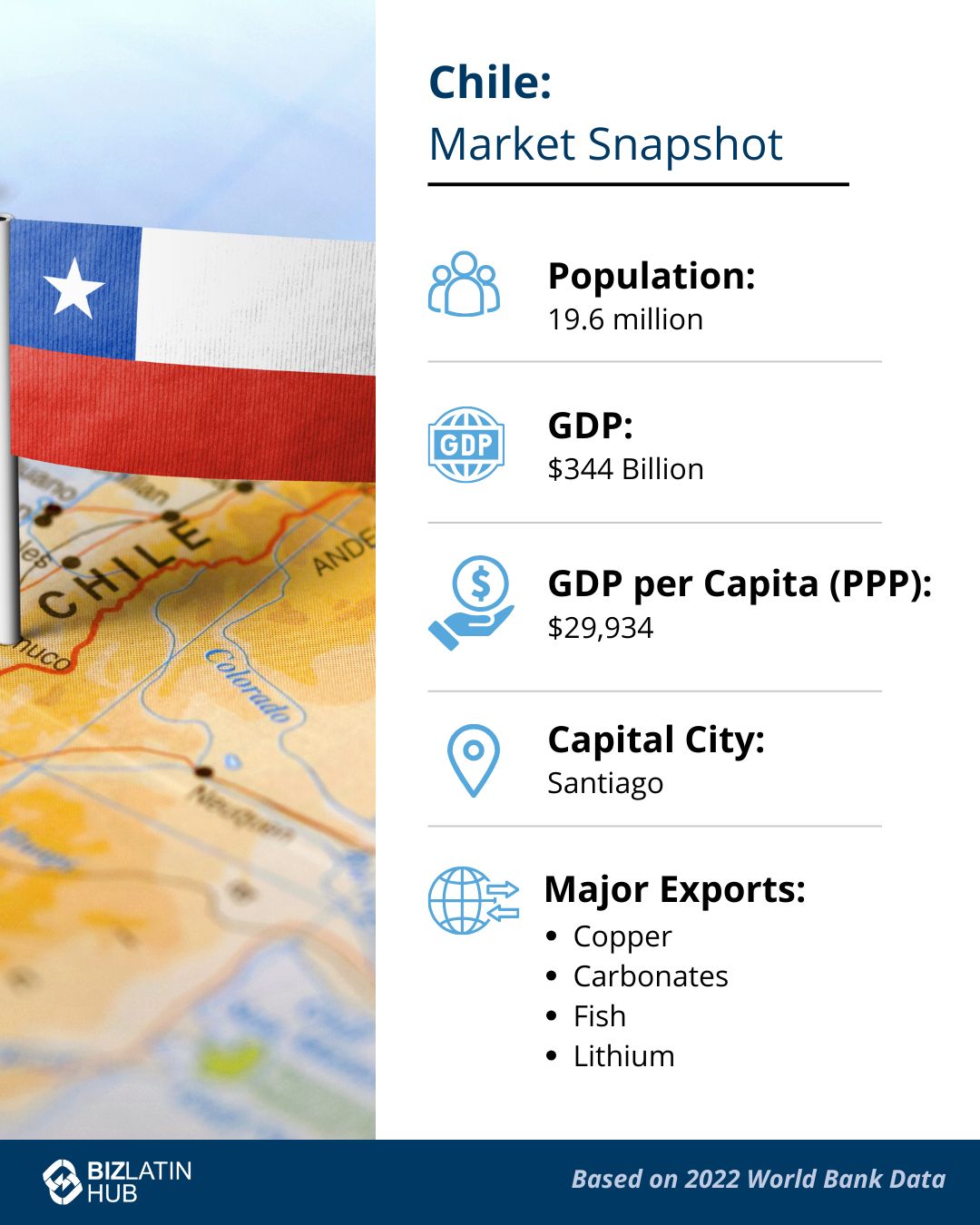The process to get a visa for Chile is relatively straightforward and offers several options to suit the different objectives of your stay in the country. For example, signing an employment contract with any local company entitles you to a visa in Chile. If you are considering company formation in Chile, for example, this could be very useful.
After two years of continuous employment, you will be eligible for permanent residency. Three years later, you can apply for naturalization and a Chilean passport, provided you meet the minimum requirements for staying in the country. This involves continuous possession of a valid visa for Chile.
Although the immigration process involves minimal bureaucracy and does not always require a lawyer, local guidance and assistance can expedite the visa process for Chile, given the occasional slowness of the visa system. A specialist such as Biz Latin Hub that understands the local conditions and ways of doing business is ideal for this.
Key Takeaways on Chile Investor Visa and Work Visa
| Topic | Key Information |
|---|---|
| Main investment threshold | USD $500,000 minimum for investor visa, USD $60,000-$75,000 for business start-up option |
| Work visa sponsorship | Chilean employer sponsorship required, valid employment contract mandatory |
| Criminal record requirement | Police clearance certificate required from home country and any country of 1.5+ year residence (within 60 days) |
| Processing times | 3-6 months for most visas, 4-8 weeks for work permits |
| Legal representation | Legal representative required for investor visa tax compliance and business operations |
| Eligible nationalities | All nationalities eligible to apply, no restrictions |
| Golden visa pathway | Temporary residency leads to permanent residency after 1-2 years, citizenship after 5 years |
3 Types of visa for Chile:

The 3 most common types of visa in Chile are:
- Tourist visa.
- Temporary residency visa.
- Permanent residency visa.
1. Tourist visa
The most common and recommended way is for foreigners to enter the country under a tourist visa, and then apply for a change of status to other forms of visa for Chile. It is not recommended that foreigners apply at their consulate in their home country before coming for other types of residency visas for Chile.
2. Temporary residency Visa
This is the first type of visa issued when applying for any sort of permanent visa for Chile. A temporary residency visa is most commonly granted after applying and being granted a visa under the retirement and periodic income visa, work visa, professional visa, family member, or through an investor visa application in Chile.
All people, regardless of the reasons for applying, must first be a temporary resident before they qualify for permanent residency in Chile. Depending on the type of visa, you will need to be a temporary resident in Chile for one to two years, and you must be physically in the country for at least 180 days within a one-year period to qualify for permanent residency.
6 Most common types of temporary residency visas:
- Retirement and periodic income visa: This is commonly used for people wishing to live, work, retire or invest in Chile.
- Professional visa: The applicant must prove both that they have a professional degree as well as a sufficient income to support their stay during their time in Chile.
- Contract work visa: You must be under contract with a Chilean employer. You must live under this visa for 2 years to qualify for permanent residency.
- Independent worker visa: This is the newest visa in Chile; it allows the applicant to work for numerous employers and provides a quicker path to full permanent residency than a contract work visa.
- Chile student visa: A temporary residency visa is granted to students that have been accepted into a Chilean university or other educational institute in Chile.
- Investor visa: This visa is complicated to attain and should be avoided, unless circumstances are such that you do not qualify for any other type of visa.
3. Permanent residency visa
This should be the ultimate goal for residency application, and regardless of the application type it requires at least 180 days of temporary residency in Chile within a one-year period. A permanent residency visa generally lasts for five years, and is renewable indefinitely. After five years, permanent residents have the option to apply for Chilean citizenship without the need to renounce their current citizenship
How to get a visa as a foreigner in Chile?
Here are the 5 steps to get a visa in Chile as a foreigner:
- Step 1 – Determine the type of visa you need: The type of visa you need depends on the reason for your visit (tourism, work, study, etc.).
- Step 2 – Gather the necessary documents: The documents you need will depend on the type of visa you are applying for.
- Step 3 – Apply for the visa online or through an experienced office: You can apply for the visa online at the Chilean immigration service website. You will need to create an account, fill out the application and pay the visa fee. This step can be made easier by hiring a company that is dedicated to this to avoid problems and possible denials.
- Step 4 – Wait for the visa to be processed: The process can take between 3 and 6 months.
- Step 5 – Receive the visa: If your application is approved, you will receive a response. The next step is to apply for the identity card at the Civil Registry.
Please note that if you plan to stay in Chile and you currently have a tourist visa, you can no longer start the temporary visa application process from Chile. If you know before coming that you plan to stay, it is best to apply for a temporary visa about 6 months in advance. Remember that the process may vary depending on your specific situation and current immigration laws.
How can I get a work visa in Chile?
To get a working visa you must have the following documents:
- Letter from employer in Chile
- Employment contract in Spanish legalized at the ministry of foreign affairs and signed by you and the employer.
- Letter of introduction
- Copy of your academic qualifications
- The biographical data page of your passport.
- A recent passport-size photo with white background.
- Application form
- Medical certificate ruling out infectious and contagious diseases.
Criminal Record Requirements for Chile Visas
All applicants for temporary residence permits in Chile must provide:
Police Clearance Certificate Requirements:
- Certificate from home country (issued within 60 days)
- Additional certificates from any country where you resided 1.5+ years in the past 5 years
- Documents must be apostilled and officially translated to Spanish
- Clean criminal record mandatory for approval
Due Diligence Process:
Chile immigration authorities conduct thorough background checks including:
- Verification of income sources for investor visas
- Employment history validation for work visas
- Cross-reference with international databases
- Review of previous visa applications to other countries
Expert Tip: Start the criminal record process early as apostille procedures can take 2-4 weeks in some countries.
What are the requirements for a business visa in Chile?
The requirements for a business visa are:
- Complete the business visa application form
- Submit a passport-style photo, two inches by two inches, white background, full face, taken within the last 6 months.
- Copy of passport valid for at least 6 months.
- Copy of driving license.
- A list of the countries you have visited in the last 5 years, with the following format: Year + country(ies) visited. If you have not been to any country, this should be indicated on the application form.
- A letter from the company where you work, duly notarized indicating name, passport number of each person travelling on business and their activities. The letter must indicate the applicant’s name and position. Only original letters are accepted.
- A letter from the inviting company in Chile, duly notarized (Notary, Ministry of Justice and Ministry of Foreign Affairs) indicating name, passport number of each person travelling on business and his/her activities. The letter must specify the applicant’s name, passport number, position, duration of stay and activities to be carried out in Chile.
- Copy of the hotel reservation.
- Copy of the return ticket.
What are the requirements for an investor visa in Chile?
You must gather the documents required by the Chilean Investment Agency and the Chilean Migration Service.
You must first submit the documents to the Chilean Investment Agency, which will review them and issue you a letter of support if it validates your project.
You must submit an investor visa application on the website of the Migration Service, before coming to Chile. Applications from within Chile are no longer authorized for this type of visa. Once you have your investor visa granted, you can move to Chile. After your arrival, you will need to register at the civil registry in Chile, requesting an appointment within 30 days.
Legal Representatives for Chile Investor Visa
Foreign investors must appoint a Chilean legal representative who:
Responsibilities Include:
- Tax compliance and SII (Chilean Tax Authority) interactions
- Municipal license applications and renewals
- Labor law compliance for business operations
- Acting as official company contact for all Chilean authorities
Selection Criteria:
- Must be Chilean citizen or permanent resident
- Professional qualifications in law or accounting preferred
- Experience with foreign investment regulations
- Proven track record with similar cases
Liability Considerations:
Legal representatives assume personal liability for company compliance, making careful selection critical for long-term success.
Chile Golden Visa: Path to Permanent Residency and Citizenship
Chile offers a structured golden visa pathway through investment:
Investment to Citizenship Timeline:
- Temporary Residency (1-2 years): Initial investor or work visa
- Permanent Residency: After 1-2 years of temporary status
- Chilean Citizenship: After 5 years of permanent residency
- Dual Citizenship: Chile allows dual nationality
Benefits of Chilean Citizenship:
- Visa-free travel to 157 countries including USA, Canada, EU
- Access to Mercosur area in South America
- No requirement to renounce original citizenship
- World-class healthcare and education systems
Physical Presence Requirements:
- Temporary residents: 180+ days per year in Chile
- Permanent residents: Minimum 1 day per year (with exemptions available)
Moving to Chile
Most people find moving to Chile to be an easy transition. It is a modern, stable and relatively wealthy country that offers expats a great quality of life. With one of the largest economies on the continent, large amounts of international trade as a result of numerous free trade agreements and a thriving market orientated economy, Chile is a great choice for expats considering relocating to Latin America.
Chile has public and private healthcare insurance and its healthcare standards are relatively high throughout the country, although the private medical facilities in the larger cities are slightly more advanced. There is also a multitude of international schools, offering quality education, primarily located in the larger cities across Chile and particularly in Santiago.
Banking in Chile can sometimes progress on ‘Chilean time’ – particularly if one doesn’t speak basic Spanish. There are some banks that have better reputations than others and banking with the bank which one’s company uses can offer many advantages. It is possible to make international transfers, however these can take time.
Expat life in Chile is vibrant and fun-filled. With great living standards, beautiful surroundings and a welcoming population, many expats choose to extend their time there – a sure sign that this South American country is a great choice to relocate to.
FAQs about getting a visa for Chile
Based on our extensive experience these are the common questions and doubts of our clients.
What are the types of visas for Chile?
Chile issues five main categories: Tourist Visa; Visa Subject to Contract (work); Student Visa; Temporary Visa (various sub-classes, including investors); and Permanent Stay.
What is an investor visa called in Chile?
Investors normally apply under the Temporary Residence Visa, choosing the “investment” or “business” sub-category.
What is a business visa called in Chile?
Short-term commercial trips use the combined Business & Tourism Visa; longer stays require the Temporary Residence Visa (business sub-class).
Who can sponsor a work visa in Chile?
Only Chile-based companies that satisfy the Immigration Service’s financial and compliance requirements may sponsor a Visa Subject to Contract.
Do you need a visa to buy property in Chile?
You do not need a specific “property visa,” but you must obtain a RUT tax-ID. Any adult holding at least a temporary visa—or even a tourist who designates a local address—can request one at the Tax Service.
What needs to be provided to start a visa application in Chile?
Begin on the government’s online portal, complete the form, and upload passport data, photos and any visa-specific documents (contract, proof of funds, enrollment letter, etc.). Originals may be requested at the consulate appointment.
What criminal record disqualifies applicants?
Convictions for serious offences—drug trafficking, money laundering, terrorism, or crimes against minors—almost always lead to refusal. Minor infractions are assessed on a case-by-case basis.
Can I apply for a Chilean work visa while in Chile as a tourist?
No. Work visas must be submitted and approved outside Chile; status cannot be changed in-country from tourist to work.
What happens if my legal representative fails to comply?
Both you and the representative may face fines, visa cancellation, or future sponsorship bans. Choose accredited professionals and keep active oversight of filings and deadlines.
Are there alternatives to the US $500,000 investment requirement?
Yes. A government-endorsed start-up can qualify with roughly US $60–75 k, while the Rentista visa needs proof of about US $1,500 monthly passive income.
How does Chile’s “golden visa” compare to European programs?
Chile asks for a lower entry investment but requires a longer residence (five years to permanent stay, then five more to citizenship). European golden visas cost more—typically US $1–5 million—but open faster routes to an EU passport.
Obtain a business visa in Chile with the help of Biz Latin Hub
At Biz Latin Hub, our team of multilingual legal and immigration experts is equipped to help you with your visa application and ensure the success of your commercial operations in Chile.
With our full suite of market entry and back-office services, we are your single point of contact to do business in Latin America. Reach out to us now to receive personalized assistance to leverage business opportunities in Chile.
Learn more about our team and expert authors.






